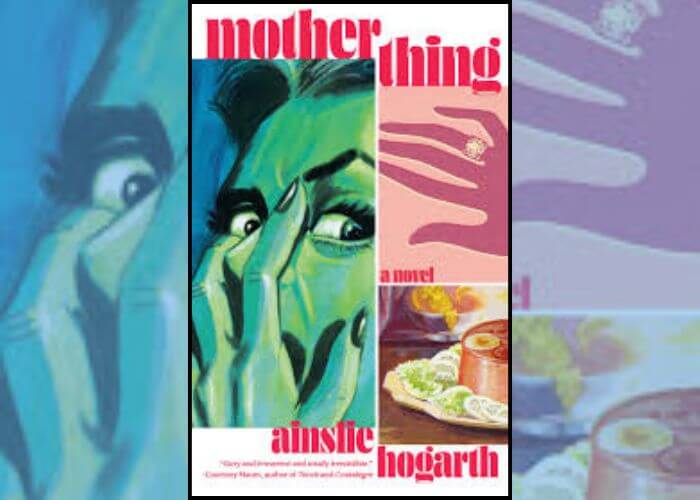Blog
Motherthing by Ainslie Hogarth – Book Review

When toxic family dynamics collide with psychological horror, the results can be both deeply disturbing and strangely compelling. Ainslie Hogarth’s debut novel “Motherthing” (2022) delivers exactly this unsettling combination, exploring the gifts and wounds that family members can inflict upon one another through a lens of comedic horror that will leave readers both laughing and shuddering.
Ainslie Hogarth crafts a psychological horror narrative that doubles as dark literary fiction, following Abby Lamb as she navigates the treacherous waters of marriage, grief, and what might be supernatural vengeance. This darkly funny exploration of mothers and daughters’ relationships earns a solid 4/5 stars for its bold approach to domestic horror and unflinching examination of family toxicity.
Plot Summary: A Marriage Haunted by the Past
Abby finds herself in an impossible situation following her marriage to Ralph. Living in the basement of the family home, she struggles to care for Ralph’s mother, Laura, whose demanding nature and manipulative behavior create constant tension. The situation becomes even more complicated when Laura takes her own life, leaving Abby to deal with both her grief and her husband’s devastation.
What follows is a descent into psychological chaos as Abby becomes increasingly convinced that her ghost continues to terrorize the household. Strange occurrences plague Abby and Ralph, and Abby is desperate to understand whether she’s experiencing supernatural phenomena or suffering a complete mental breakdown. The vengeful ghost of her mother-in-law seems determined to maintain her hold on the family even from beyond the grave.
The central mystery revolves around whether Abby is being genuinely haunted by her deceased mother-in-law or if her deteriorating mental state is creating these terrifying experiences. Hogarth skillfully maintains this ambiguity throughout the narrative, never definitively answering whether the supernatural elements are real or imagined.
What Works Brilliantly
Character Development That Cuts Deep
Abby serves as a masterfully crafted unreliable narrator whose perspective becomes increasingly questionable as the story progresses. Her character reveals layers of complexity rooted in her traumatic childhood, making her desperate need for a caring mother figure both understandable and heartbreaking. Abby had a traumatic childhood that left her vulnerable to manipulation and desperate for acceptance.
Ralph’s character provides a compelling counterpoint to Abby’s increasing instability. His relationship with his mother was complicated and codependent, and Hogarth explores how this dynamic continues to affect his marriage even after Laura’s death. The tension between Ralph and Abby intensifies as they struggle to process their shared trauma.
The deceased mother, Laura, maintains a powerful presence throughout the narrative, her influence extending far beyond her physical death. Hogarth presents her as a complex figure whose toxic behavior toward Abby creates lasting psychological wounds.
Atmospheric Horror That Permeates Daily Life
Hogarth’s greatest strength lies in her ability to transform ordinary domestic settings into spaces of dread and unease. The family home becomes a character in its own right, with its basement dwelling and memories of chicken à la king dinners taking on sinister undertones. The claustrophobic atmosphere builds steadily as Abby becomes increasingly isolated.
The horror novel succeeds in blending psychological terror with potentially supernatural elements, creating an unsettling reading experience that lingers long after the final page. Hogarth demonstrates remarkable skill in making readers question reality alongside Abby, never providing easy answers about what’s truly happening.
Writing Style and Thematic Depth
Ainslie Hogarth’s prose combines stream of consciousness techniques with bizarrely funny observations that create a unique voice in contemporary horror. The writing style perfectly captures Abby’s deteriorating mental state while maintaining enough clarity to keep readers engaged with the unfolding mystery.
The novel serves as a powerful commentary on women’s roles within family structures and the expectations placed upon daughters-in-law. Hogarth explores themes of mental health, grief, and the ways in which toxic family members can continue to inflict damage even after death. The mother figure archetype receives particularly sharp examination, revealing how maternal relationships can become sources of trauma rather than comfort.
Areas That Could Use Improvement
While “Motherthing” succeeds in most areas, some readers might find the ambiguity frustrating rather than intriguing. The line between supernatural and psychological elements remains deliberately blurred, which may not satisfy readers seeking definitive answers about the nature of Abby’s experiences.
The pacing occasionally slows during Abby’s internal monologues, though these moments also provide crucial character development. Some plot elements feel underdeveloped, particularly regarding Abby’s background and her work at the nursing home where she works.
The gory elements, while not excessive, might prove too intense for readers sensitive to graphic content. Hogarth includes several disturbing scenes that serve the story’s themes but could be triggering for some audiences.
Literary Merit and Genre Innovation
“Motherthing” positions itself uniquely within contemporary horror literature, drawing comparisons to authors like Carmen Maria Machado and Gillian Flynn while maintaining its own distinct voice. Hogarth contributes meaningfully to ongoing discussions about mental health representation in fiction, avoiding both stigmatization and oversimplification.
The unreliable narrator technique receives expert handling, with Abby’s perspective gradually revealing its limitations without completely undermining the reader’s investment in her experience. This approach allows Hogarth to explore complex themes of trauma, family dysfunction, and psychological breakdown with nuance and sensitivity.
Reader Recommendations
Who Should Read This
Fans of psychological horror will find much to appreciate in Hogarth’s debut. Readers who enjoyed works like “The Silent Companion” or “Mexican Gothic” will likely connect with the domestic horror elements and family dysfunction themes. Those interested in dark literary fiction that challenges conventional narrative structures will appreciate the novel’s ambitious approach.
Anyone fascinated by unreliable narrators and the ways trauma shapes perception will find Abby’s journey compelling, even when disturbing. The book offers rich material for discussion about family relationships, mental health, and the persistence of toxic patterns across generations.
Content Warnings
Potential readers should be aware of several sensitive themes throughout the narrative. The book contains detailed discussions of suicide, mental health struggles, and psychological abuse. Abby is terrorized both psychologically and potentially supernaturally, creating scenes that may be triggering for readers with similar experiences.
The novel includes themes of family dysfunction, toxic relationships, and emotional manipulation that could be difficult for readers dealing with similar situations. While Hogarth never missteps in her handling of these themes, the content remains challenging and potentially distressing.
Who Might Want to Skip
Readers seeking traditional supernatural horror with clear explanations for paranormal events may find the ambiguous approach frustrating. Those uncomfortable with unreliable narrators or stories that resist definitive conclusions might prefer more straightforward narratives.
Anyone particularly sensitive to themes of suicide, family abuse, or detailed descriptions of psychological breakdown should approach this book with caution. The deeply unsettling nature of many scenes requires emotional resilience from readers.
Final Verdict
“Motherthing” represents a remarkable debut that successfully combines psychological horror with sharp social commentary. Ainslie Hogarth has created a woman who must take extraordinary measures to save her husband while confronting her own psychological demons and the lasting impact of toxic family relationships.
The novel’s greatest strength lies in its unflinching examination of how family can inflict lasting damage through seemingly ordinary interactions. Hogarth demonstrates that the most terrifying horror often occurs within the supposed safety of family homes, where love and manipulation intertwine in destructive ways.
While the ambiguous ending may not satisfy all readers, it serves the story’s themes perfectly, acknowledging that some psychological wounds resist easy resolution. This approach makes “Motherthing” a book that rewards multiple readings and ongoing reflection.
Rating: 4/5 stars
This book deserves recognition as one of the best books of the year for its innovative approach to horror and its meaningful contribution to conversations about family trauma and mental health. I love this book for its willingness to tackle difficult subjects with both humor and compassion.
Discussion Questions for Book Clubs
1. How does Abby’s traumatic childhood influence her interactions with Ralph’s mother and her interpretation of supernatural events?
Abby’s traumatic childhood—particularly her relationship with her emotionally unstable and suicidal mother—deeply colors her interactions with Ralph’s mother, Laura. Her instinct to “fix” broken maternal relationships drives her need to be the perfect daughter-in-law and caregiver. When Laura becomes abusive and manipulative, Abby’s unresolved trauma resurfaces, causing her to perceive Laura’s hostility as not just psychological, but supernatural. The ghostly elements may reflect Abby’s projection of past pain rather than literal hauntings, making the horror more about her internal struggles than external forces.
2. What role does the family home play as a setting, and how does living in the basement symbolically represent Abby’s position within the family structure?
The house is more than just a backdrop—it acts as a claustrophobic trap and a battleground for control, particularly between women. Abby and Ralph’s relegation to the basement underscores their lower status within the household, especially under Laura’s domineering presence. Symbolically, the basement reflects Abby’s emotional repression and her subordinate role in both her marriage and family dynamics. It mirrors her descent into instability, both mentally and socially, as she becomes more isolated and desperate.
3. How does Hogarth use food imagery, particularly chicken à la king, to represent family traditions and control?
Food, and especially chicken à la king, serves as a recurring motif symbolizing the ways family expectations are imposed and internalized. Laura uses food as a tool of control, insisting on outdated meals to preserve her dominance over the household and enforce her version of “normalcy.” Abby, in turn, weaponizes food in her efforts to reclaim power, sometimes using it to mimic nurturing, other times to unsettle. The grotesque focus on food reflects the breakdown of traditional domestic roles and the thin line between comfort and control.
4. Is Abby a sympathetic character despite her increasingly unreliable perspective? How does Hogarth maintain reader empathy for her protagonist?
Yes, Abby remains sympathetic because readers are given intimate access to her thoughts, insecurities, and emotional wounds. Her voice is darkly humorous, vulnerable, and often painfully honest, even as her grip on reality falters. Hogarth balances Abby’s disturbing actions with a nuanced portrayal of her mental deterioration, shaped by trauma and neglect. Readers may question her reliability, but her motives are rooted in pain and a deep desire for love and belonging, making her both tragic and relatable.
About the Author
Ainslie Hogarth brings a fresh voice to contemporary horror literature with her debut novel. Her background in exploring psychological themes and family dynamics shines through in “Motherthing,” establishing her as an author to watch in the horror genre. Hogarth’s ability to balance darkly funny observations with genuine emotional depth suggests a promising career ahead in literary fiction and horror writing.
